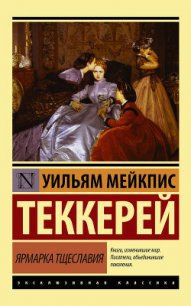Ярмарка тщеславия / Vanity Fair - Теккерей Уильям Мейкпи (читаем книги онлайн бесплатно полностью без сокращений txt) 📗
And when the time for the ballet came she skipped back to her own box, leaning on Captain Dobbin’s arm this time. No, she would not have George’s: he must stay and talk to his dearest, best, little Amelia.
“What a humbug that woman is! [19]” honest old Dobbin mumbled to George, when he came back from Rebecca’s box, where he had conducted her in perfect silence. “She twists about like a snake.”
“Hang it, she’s the nicest little woman in England,” George replied, showing his white teeth.
Amelia’s manners were such when she and George visited Crawley and his wife at these quarters, that they had very nearly come to their first quarrel; that is, George scolded his wife violently for her evident unwillingness to go, and the high
and mighty manner in which she comported herself towards Mrs. Crawley, her old friend; and Amelia did not say one single word in reply; but with her husband’s eye upon her, and Rebecca scanning her as she felt, was, if possible, more awkward on the second visit which she paid to Mrs. Rawdon, than on her first call.
Rebecca was doubly affectionate, of course, and would not take notice, in the least, of her friend’s coolness. “I think Emmy has become prouder since her father’s name was in the – since Mr. Sedley’s MISFORTUNES,” Rebecca said, softening the phrase charitably for George’s ear.
Mr. Osborne, having a firm conviction in his own mind that he was a woman-killer and destined to conquer, did not run counter to his fate, but yielded himself up to it. And as Emmy did not say much, but merely became unhappy, he chose to fancy that she was not suspicious of what all his acquaintance were perfectly aware – namely, that he was carrying on a desperate flirtation with Mrs. Crawley. He rode with her whenever she was free. He pretended regimental business to Amelia and passed his evenings in the Crawleys’ company; losing money to the husband and flattering himself that the wife was dying of love for him.
George was so occupied with his new acquaintances that he and William Dobbin were by no means so much together as formerly. George avoided him in public and in the regiment. As Dobbin upon those days when he visited the Osborne house, seldom had the advantage of meeting his old friend, much painful and unavailing talk between them was spared. Our friend George was in the full career of the pleasures of Vanity Fair.
On the appointed night, George drove to the famous ball, where his wife did not know a single soul. After placing Amelia on a bench, he left her to her own thoughts there. Her thoughts were not of the pleasantest, and nobody except honest Dobbin came to disturb them. Whilst her appearance was an utter failure [20] (as her husband felt with a sort of rage), Mrs. Rawdon Crawley’s debut was, on the contrary, very brilliant. She arrived very late. Her face was radiant; her dress perfection.
George danced with Rebecca twice or thrice – how many times Amelia scarcely knew. At last George came for Rebecca’s shawl and flowers. She was going away. She did not even come back and say good-bye to Amelia. The poor girl let her husband come and go without saying a word, and her head fell on her breast.
“William,” she said, suddenly clinging to Dobbin, who was near her, “you’ve always been very kind to me – I’m – I’m not well. Take me home.” He went away with her quickly.
George led Becky to the coach and passed her a bouquet of flowers in which there lay a letter. In this letter Amelia’s faithful husband asked Becky to elope with him and search for a new life. Osborne, wild with elation, went off to a play-table, and began to bet frantically.
“Come out, George,” said Dobbin, still gravely; “don’t drink.”
“Drink! there’s nothing like it. Drink yourself, and light up your lantern jaws, old boy. Here’s to you.”
Dobbin went up and whispered something to him, at which George walked away speedily on his friend’s arm. “The enemy has passed the Sambre,” William said, “and our left is already engaged. Come away. We are to march in three hours.”
George thought over his brief married life. How wild and reckless he had been! How unworthy he was of her. He sat down to write a letter to his father. George came in and looked at her again, entering still more softly. By the pale night-lamp he could see her sweet, pale face. Good God! how pure she was; how gentle, how tender, and how friendless! and he, how selfish, brutal, and black with crime! God bless her! God bless her! He came to the bedside, and bent over the pillow noiselessly towards the gentle pale face.
Two fair arms closed tenderly round his neck as he stooped down. “I am awake, George,” the poor child said, with a sob fit to break the little heart that nestled so closely by his own. She was awake, poor soul, and to what? At that moment a bugle from the Place of Arms began sounding clearly, and was taken up through the town; and amidst the drums of the infantry, and the shrill pipes of the Scotch, the whole city awoke.
13
Thus all the superior officers being summoned on duty elsewhere, Jos Sedley was left in command of the little colony at Brussels.
The following days were the grave ones. Only Rebecca had the heart to proceed with her affairs of flirting with Jos and searching for new sources of income. Darkness came down on the field and city: and Amelia was praying for George, who was lying on his face, dead, with a bullet through his heart.
The news which that famous Gazette brought to the Osbornes gave a dreadful shock to the family and its chief. The girls indulged unrestrained in their grief. The gloom-stricken old father was full of sorrow. Sometimes a shuddering terror struck him, as if he had been the author of the doom which he had called down on his son. There was a chance before of reconciliation. The boy’s wife might have died; or he might have come back and said, Father I have sinned. But there was no hope now. And it is hard to say which pang it was that tore the proud father’s heart most keenly – that his son should have gone out of the reach of his forgiveness, or that the apology which his own pride expected should have escaped him.
About three weeks after the 18th of June, Mr. Osborne’s acquaintance, Sir William Dobbin, called at Mr. Osborne’s house in Russell Square, with a very pale and agitated face, and insisted upon seeing that gentleman. He took out a letter sealed with a large red seal. “My son, Major Dobbin,” the Alderman said, with some hesitation, “dispatched me a letter by an officer. My son’s letter contains one for you, Osborne.” The Alderman placed the letter on the table, and Osborne stared at him for a moment or two in silence.
The poor boy’s letter did not say much. He had been too proud to acknowledge the tenderness which his heart felt. He only said, that on the eve of a great battle, he wished to bid his father farewell, and solemnly to implore his good offices for the wife – it might be for the child – whom he left behind him. He thanked his father for his former generous conduct; and he promised him that if he fell on the field or survived it, he would act in a manner worthy of the name of George Osborne. His English habit, pride, awkwardness perhaps, had prevented him from saying more. His father could not see the kiss George had placed on his letter. Mr. Osborne dropped it with the bitterest, deadliest pang of affection and revenge. His son was still beloved and unforgiven.
If the sisters had any anxiety regarding the possible recognition of Amelia as a daughter of the family, it was increased presently, and towards the end of the autumn, by their father’s announcement that he was going abroad. He did not say whither, but they knew at once that his steps would be turned towards Belgium, and were aware that George’s widow was still in Brussels.



